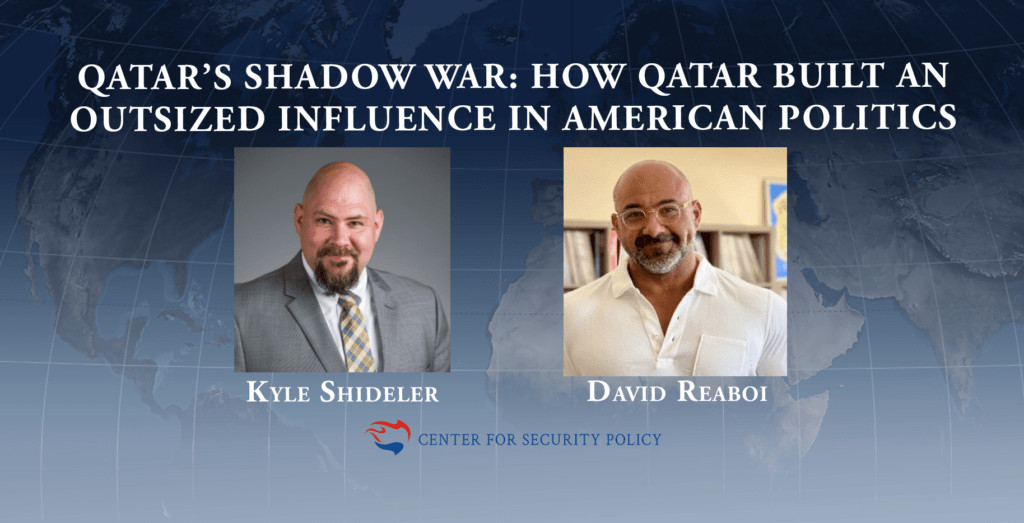Webinar: Qatar’s Shadow War: How Qatar Built an Outsized Influence in American Politics

The fundamental understanding of who America’s enemies and allies are has collapsed leading to an era where information and the media are the new battlespace, and countries increasingly seek to achieve their policy ends by manipulating the minds of the citizenry warns the author of a new book.
Dave Reaboi, Center for Security Policy senior fellow and author of Qatar’s Shadow War: the Islamist Emirate and its Information Operations in the United States told a Center for Security Policy webinar audience that decades of foreign policy consensus in the United States has come unraveled.
“From the end of the World War Two, until the second term of Obama, most Americans saw the same countries as allies and as enemies. We had a fundamental way of understanding this, despite difference between so-called hawks and doves,” Reaboi explained.
The Obama administration managed to invert this consensus through a concentrated policy effort to transition Islamist groups throughout the Middle East. Both Sunni groups, such as the Muslim Brotherhood, and Shia, such as the leaders of the Iranian regime.
One of the primary beneficiaries of this effort was Qatar, whose regime has long been legitimized by its support for Muslim Brotherhood clerics such as the infamous Yusuf Al Qaradawi. Qatar likewise has maintained excellent ties to the Islamic Republic of Iran, to the chagrin of its fellow Gulf Cooperation Council Saudi Arabia and United Arab Emirates.
When the Trump Administration took office and attempted to reverse this policy in favor of one which sought to unite U.S. regional allies against common foes –such as Iran—the Qataris responded by deploying a sophisticated information operation aimed at paralyzing U.S. policy.
When its neighboring Arab states demanded Qatar stop promoting Islamist revolution in the region and end its close ties to Iran, it refused, resulting in the Arab blockade. Reaboi notes that because Islamism is deeply ingrained in the Qatari regime’s legitimacy there was little expectation they would adapt.
“As a matter of fact, immediately after this happened, the Emir of Qatar made a special point to appear in public with [Muslim Brotherhood leader Yusuf] Qaradawi and kiss him on the cheek,” Reaboi noted.
When President Trump endorsed the criticism of Qatar, Reaboi noted “pushback was massive” and came from multiple circles of influence, including the media, but also the U.S. military, which had become accustomed to dealing with the Qataris.
Qatar’s response was a classic information operation. Reaboi defined it as taking “place within the confines of public discourse, using mass media to disseminate weaponized information.” Reaboi went on to explain how the Qatari regime amplified this effort through using influence operations to acquire the support of journalists and media influencers by offering trips, funding, and information.
This operation took advantage of the growing partisanship of the media, which has been increasingly willing to eschew objectivity in favor of accepting partisan opposition research or openly engaging in editorializing. “There’s the total collapse of any semblance of responsibility or professionalism on the part of the media,” Reaboi noted.
Reaboi noted that Qatari flagship media outlet Al Jazeera takes advantage to spin two messages, one in Arabic and one in English. This allowed Qatar to paint Saudi Arabia as “authoritarian” in English while condemning the ongoing liberalization project of Saudi Crown Prince Mohammad Bin Salman in Arabic.
Reaboi says, “When it comes to broader issues, the Al Jazeera coverage in English is right where The Guardian is. It’s right up the alley of social justice… not just from the left but the far left.”
Recently however Al Jazeera has made a play for conservative audiences as well with a new online channel. “
So far they haven’t done much, they’re spending a lot of money on Facebook and Youtube, high production value,” Reaboi noted, “But look, they’ve got enough money to put millions of dollars behind this project and think nothing of it. So of course, that’s a concern.”
It seems as long as the media landscape remains rankly partisan Americans are likely to be at the mercy of foreign funded information operations.
- Anarchist orchestrated “economic blockade” is about more than Palestine - April 16, 2024
- Return of the sheriff - February 27, 2024
- US over-reliance on electronic intelligence risks deceptive consequences: Shideler - February 7, 2024
